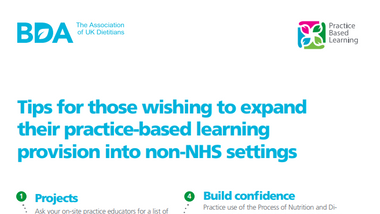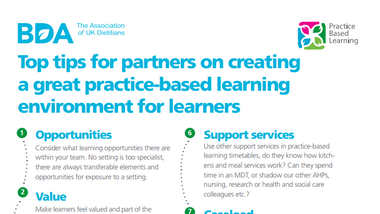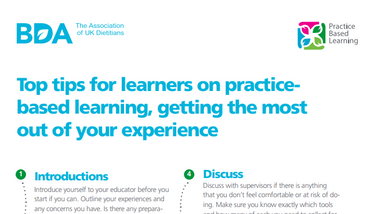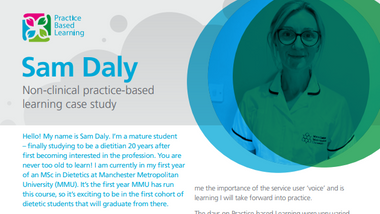Top tips for starting Practice-based learning
This page aims to provide those who will be setting up Practice-based learning (placements) for learners (students) with the resources to aid set up, tips and things to consider when setting up Practice-based learning and useful documents that can be provided to learners ahead of or during their Practice-based learning.
Engaging with learners on Practice-based learning
Before the learner begins their Practice-based learning, you may want to contact them beforehand to introduce yourself and tell them about the team and what they will be up to. We've developed this useful email template to aid your introduction. You may also benefit from gathering key information about where they will be. This template has been developed to support the collection of such information.
Structuring Practice-based learning
The below resources have been developed to support you in planning the structure of a learners Practice-based learning:
- 10 week Practice-based Learning blank timetable
- Example of a Learning Evidence Matrix - Birmingham City University
- Example of a Learning Evidence Matrix - Coventry University
Utilising the workforce in the delivery of Practice-based learning
Training learners is part of everyone’s role. When planning a Practice-based Learning it is important to consider the role that the wider team can play. Here are how some roles can be involved in the learner experience.
Admin
Staff involved in admin processes are integral to any department, consider if they have a chance to explain to the learners how processes work and their role supporting the department. This could this be built into their timetable. Admin staff could provide pastoral or mentor support as someone who may have a wealth of knowledge to support learners differently.
Dietetic Support Workers
Dietetic Support Workers or Dietetic Assistants keep us moving. Making sure that learners know what they do and how they support qualified staff and service users (patients) is important. When setting up Practice-based learning, why not ensure that learners have the chance to spend time with the Support Workforce? Assistants can supervise learners (if they feel comfortable) and may be able to countersign learners (dependant on trust policy) and play an active part in learner training. Those acting as practice educators may access local mentorship / practice supervisory skills training.
Other AHPs and other NHS colleagues
Do your learners know what other Health Care Professionals do and how we work with them? If not can they shadow Health Care Professionals for a session, maybe attend a ward round or any other training our colleagues are doing?
Have our learners spent time shadowing other professionals or perhaps shadowed a service user round, multidisciplinary team clinics or group sessions? Could a learner follow a service user's journey? If they haven’t this is a great way for learners to see how dietetics fits into the service user experience. Learners could see how health education spans community, primary, secondary, and tertiary care, another great way to expand a learner understanding of the wider determinants of health and potential impact on dietetic interventions.
These case studies from learners who have previously completed Practice-based learning across a variety of different settings highlights how important a varied learning experience can enrich and enhance learners on their journey towards becoming Registered Dietitians.







